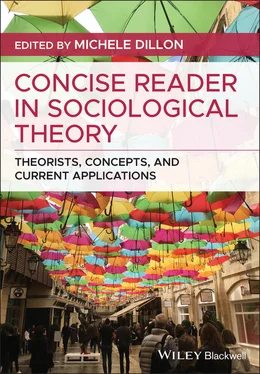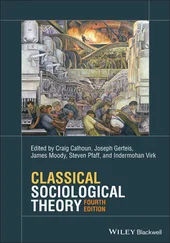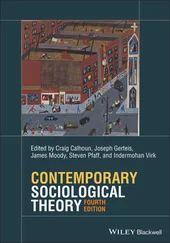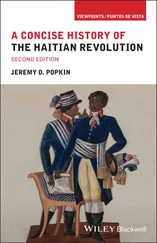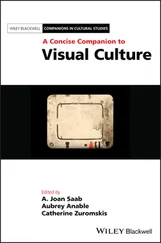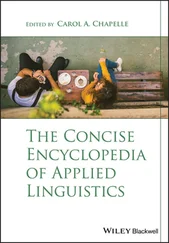Section IV returns us to the influence of European theorists on the development of sociology, especially as the discipline both emerged from the influence of Parsons in the late 1970s, and also attempted to take stock of the social changes of the post‐World War II era, an era that for all of its progress – increased affluence, the expansion of university education, the growth of the middle classes, and the expansion of mass media – did not eliminate social inequality. This section includes excerpts from theorists associated with the Frankfurt School ( chapter 10), most notably Max Horkheimerand Theodor W. Adornowho wrote extensively and in a withering manner critiquing the strategic manipulation and manipulating effects of politics and consumer culture by economic interests. The Frankfurt School’s second generation, and undoubtedly the most renowned social theorist alive today, Jürgen Habermas, outlines a way forward from the contemporary debasement of reason, one that returns attention to the possibility of using reason to discuss societal problems and to craft solutions that serve the common good. This section also includes excerpts from the extensive work of Pierre Bourdieu( chapter 11) who has been highly impactful in getting sociologists to think differently and to conduct innovative research (e.g. Lareau 1987) about how social inequality is reproduced, especially through the informal cultures of school and in the ordinary everyday habits and tastes prevalent in family life. Michel Foucaultis perhaps the most intellectually radical of all social theorists ( chapter 12). His originality is especially seen in his construal of biopower and how he frames and analyzes the birth of sexuality and of other body‐controlling structures (clinics, prisons). Widely read beyond sociology, his analysis of the fluidity of sexuality and power underpins much of queer theory, elaborated for sociologists by Steven Seidman( chapter 12).
The fifth and final section continues the emancipatory spirit of the post‐1970s critique. This vibrant body of work includes (in chapter 13) selections from the early feminist theorist Charlotte Perkins Gilman,the ground‐breaking focus by Arlie Hochschildon emotion work and its gendered structure, and leading contemporary feminist theorist Dorothy E. Smitharticulating the necessity of standpoints that seek to understand from within the experiences of outsiders (e.g. women, members of minority racial and ethnic groups, LGBTQ+). Additionally, Patricia Hill Collinsgives sustained attention to a Black women’s standpoint as well as the complex intersectionality of individuals’ identities and experiences, and to what this requires of scholars who seek to study intersectionality. Important here also is the construal and reassessment of hegemonic and nonhegemonic masculinities by R.W. Connelland James W. Messerschmidt.
In a parallel vein, postcolonial theories ( chapter 14) draw attention to the structured dehumanization of racial and ethnic outsiders, and to the enduring legacies of slavery and colonial domination on the delegitimation of postcolonial identities and cultures. The pioneering Black sociologist W.E. Burghardt Du Boiswas the first to forcefully articulate the bifurcating effect of slavery on the consciousness and identity of enslaved people and its legacy on postslavery generations of Black people. Edward W. Saidfocuses on the West’s construal of the (inferior) Otherness of the Orient, while Frantz Fanonevocatively conveys the everyday reality and experience of being a Black man in a racist society. Stuart Hallunderscores the plurality and diversity of postcolonial histories, cultures, and identities and offers an emancipatory vision of cultural identity as an ongoing project that can dynamically integrate past and present into a new authentic synthesis. Contemporary scholars also increasingly point to the colonial and Northern/Western biases in what is regarded as legitimate knowledge, including biases in sociological knowledge, as elaborated by Raewyn Connelland colleagues. Others, such as Alondra Nelson, draw out the somewhat unexpected progressive social consequences of DNA testing and the use of genetic data by universities engaged in initiatives to make reparations to the descendants of freed slaves.
The final chapter ( chapter 15) features excerpts highlighting what is distinctive about global society, our contemporary moment of late modernity, characterized by an array of transnational actors and processes. Zygmunt Baumanhighlights what he sees as the diminishing role of the nation state and of its protective function toward its citizens and their well‐being. Anthony Giddensdiscusses the disembeddedness of time and space and its consequences for individual selves and social processes. Ulrich Beckelaborates on the globalization of risk society and highlights its encompassing nature. Additionally, he and Edgar Grandehighlight the variations in modernity and suggest the need for a cosmopolitanism that would more fully recognize the mutuality of all peoples and societies across the world. Focusing primarily on the post‐secular West, and the political and cultural divisions between moderate religious and secular impulses, Jürgen Habermasarticulates how we might go about crafting more respectful and enriching discourses with those whose beliefs, ideas and experiences are different to ours.
1 Comte, Auguste. 1891/1973. The Catechism of Positive Religion. 3rd ed. Trans. Richard Congreve. Clifton, NJ: Augustus M. Kelley.
2 Hoecker‐Drysdale, Susan. 1992. Harriet Martineau: First Woman Sociologist. Oxford: Berg.
3 Lareau, Annette, 1987. “Social Class Differences in Family–School Relationships: The Importance of Cultural Capital.” Sociology of Education 60: 73–85.
4 Martineau, Harriet. 1838. How to Observe Morals and Manners. London: Charles Knight.
PART I CLASSICAL THEORISTS
CHAPTER ONE KARL MARX
CHAPTER MENU
1A Wage Labour and Capital (Karl Marx)
II
1B Economic and Philosophical Manuscripts of 1844 (Karl Marx and Frederick Engels)
Profit of CapitalCapital The Profit of Capital
1C The German Ideology(Karl Marx and Friedrich Engels)
Karl Marxwho was born in Germany in 1818 and died in London, England, in 1883, remains the foremost theorist in explaining the deep structural inequalities within capitalism. Despite the rapid pace of ongoing social change today – just think of the use and impact of the iPhone alone – and the many transformative changes in society since Marx’s lifetime, which was the epoch of expanding industrialization, factory production, and urbanization – his understanding of how capitalism works, and why it expands and endures, exposes the economic, political, and cultural logics that enable capitalism to thrive despite the many personal and societal ills it simultaneously causes. In the popular imagination – among those who have not studied Marx – Marx is frequently thought of as someone who is opposed to work and for this reason postulated The Communist Manifesto (not included) as a vision of a world in which work would not be necessary. This, however, is a gross mischaracterization and misunderstanding of Marx and his theorizing. Yes, Marx envisioned the revolutionary downfall of capitalism as part of a long historical process and its replacement with a society built on a utopian equality in which, with each person working or contributing based on their particular skills and talents, the individual and collective needs of the community would be satisfied. Clearly this vision has not been realized, and in fact capitalism has grown exponentially such that today we live in a truly global capitalist society, with capitalist processes and consequences apparent in every country in the world (including those that are nominally communist, such as Cuba and North Korea). However, the explanatory power of much of Marx’s theorizing (notwithstanding its frequent polemical tone and some erroneous assumptions and predictions) is such that it sharply illuminates why and how capitalism has so successfully endured.
Читать дальше
